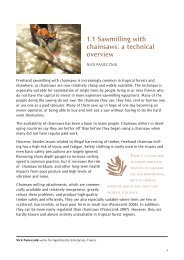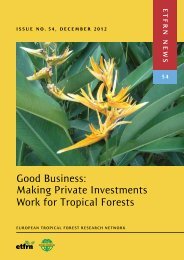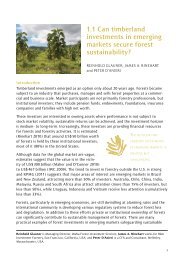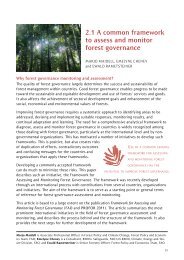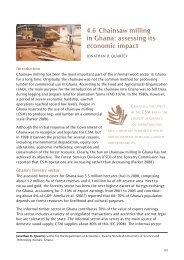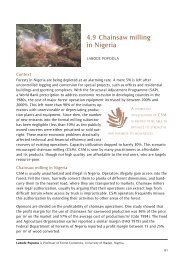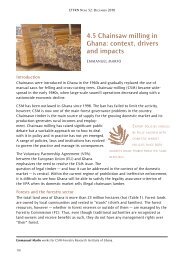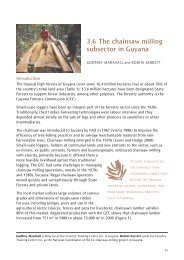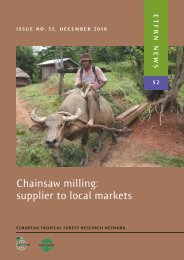Chainsaw milling: supplier to local markets - European Tropical ...
Chainsaw milling: supplier to local markets - European Tropical ...
Chainsaw milling: supplier to local markets - European Tropical ...
You also want an ePaper? Increase the reach of your titles
YUMPU automatically turns print PDFs into web optimized ePapers that Google loves.
4.1 chaiNsaw milliNg iN ThE coNgo basiN<br />
tional market — applied for the industry in Cameroon (Table 4, columns f and g). There<br />
are several reasons for these differences:<br />
• First and foremost, the quality of the product required by the international market is<br />
higher, and specifications stricter.<br />
• Domestic timber is not charged with formal taxes — stumpage, sawmill entry, export<br />
fees — so its production costs are lower.<br />
• There is much more competition in the domestic market, with thousands of chainsaw<br />
millers able <strong>to</strong> source the market, than in the industrial one, where only a handful of<br />
logging companies specialize in a few products and species.<br />
• Timber is much cheaper for chainsaw millers, as the commercial value of trees is<br />
underestimated by cus<strong>to</strong>mary owners.<br />
Table 4. selling prices of the most used products per species<br />
a. source b. product c. species d. sales<br />
(%)<br />
chainsaw<br />
<strong>milling</strong><br />
e. selling<br />
price (us$/<br />
m 3 RwE)<br />
f. FoB<br />
price (us$/<br />
m 3 RwE<br />
2009,<br />
cameroon)<br />
g.% of<br />
export<br />
price (E/F)<br />
plank ayous 4.7 34.0 183.4 18<br />
formwork ayous 16.3 31.4 183.4 17<br />
conclusion and recommendations<br />
<strong>Chainsaw</strong> lumber production in the forestry sec<strong>to</strong>rs of the countries of the Congo basin<br />
has been under-researched and neglected by official policies. as a consequence, data<br />
about the sec<strong>to</strong>r, and its impacts on rural and national economies, are often excluded<br />
from official statistics.<br />
all Congo basin countries are involved in the FlEGT/Vpa process 5 that requires all wood<br />
commodities — for export or domestic consumption — <strong>to</strong> be legally produced and tracked.<br />
This puts a massive pressure on states <strong>to</strong> recognize, legalize and organize the informal<br />
sawnwood sec<strong>to</strong>r.<br />
preliminary results of this project show that the domestic timber market has boomed in<br />
recent years, with an overall annual production — about 1.2 million m 3 of processed<br />
products — similar <strong>to</strong> industrial production, and with important impacts on <strong>local</strong><br />
economies, rural livelihoods and governance.<br />
many challenges lie ahead, in formalizing and improving the sec<strong>to</strong>r’s contribution <strong>to</strong><br />
national economies. neither national strategies nor public policies have been developed <strong>to</strong><br />
guide the sec<strong>to</strong>r through formal, transparent and equitable growth. This forces thousands<br />
of people <strong>to</strong> produce and sell illegal timber, because of the lack of a legal framework for<br />
their activities, and because many vested interests (decentralized civil servants, urban<br />
businesspeople, military forces) challenge the development of a national formal timber<br />
market. although illegality is not considered <strong>to</strong> be a problem by most chainsaw millers<br />
127



